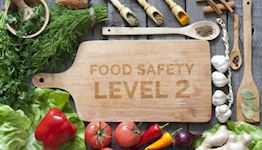Food Safety Level 2 (next day posted certificate)
ROSPA Accredited | Institute of Hospitality Endorsed | CPD | Local Authority Approved
The Training Terminal
Summary
- Tutor is available to students
Add to basket or enquire
Overview
Get an accredited Food Safety Level 2 Qualification! The added bonus once you have finished the course you will get a hard copy of your Certificate posted to you the next day!
Both our Food Safety and Health and Safety Courses are approved by The Royal Society in the Prevention of Accidents. The ROSPA stamp of approval means you can be assured that our course content is the very best the market has to offer and is up to scratch with regards best practice and legislative information.
The Food Safety Level 2 course will give food handlers the legally required certification to work in the catering sector.
It is aimed at anyone who handles food in the catering or hospitality industry – including restaurants, hotels, bars, takeaways, kitchens, hospitals and schools.
The course covers the essential aspects of food hygiene and safety during all stages of food handling, so that you can minimise food safety hazards and ensure that the food you work with remains safe for customers to eat. You will also learn about the legal responsibilities of working with food and how to comply with the law.
CPD
Course media
Description
Course Content
Our Food Safety/Food Hygiene Level 2 Course has been structured into seven easy to follow modules covering all aspects of food safety and hygiene.
Introduction to Food Safety – This introductory module will explore why food safety is so important and what risks are associated with poor food safety and hygiene standards. You will also learn about the legal requirements of food handlers as well as the consequences of breaking food safety law.
Personal Hygiene – In this section we learn about the importance of personal hygiene. We examine how food handlers are potentially the biggest hazard in a food business and how they can ensure that they do not contaminate food with pathogenic bacteria or foreign body hazards.
Microbiological Food Hazards and their Control – You will learn about the different types of food hazards and how they can be avoided. You will gain a thorough understanding of bacteria, how cross contamination can occur and the various techniques you can use to prevent the spread of potentially harmful bacteria in your place of work.
Other Food Safety Hazards and their Control – In this module we examine food allergens, allergic reactions and how to keep customers with food allergies safe. We also cover chemical and physical food contamination and how you can prevent it from occurring.
Food Handling, Storage and Preparation – Here we learn how to handle food correctly, from delivery through to serving customers. Find out how to store food correctly to avoid spoilage and contamination, how to prepare foods safely and the importance of temperature control.
Keeping the Workplace Clean and Hygienic – In this section we learn why it is essential to clean correctly and how to clean effectively. We also examine the different methods of cleaning and gain an understanding of the various chemicals used in the cleaning process.
Design of Food Premises and the Control of Pests – Finally, we examine how the proper design of food premises can prevent the risk of food contamination. We also gain an understanding of the various risks associated with common pests and how we can control them.
Accreditations
Both our Food Safety and Health and Safety courses are approved by The Royal Society in the Prevention of Accidents. The ROSPA stamp of approval means you can be assured that our course content is the very best the market has to offer and is completely up to date in terms of best practice and legislation. The course is also accredited by the CPD.
Format
The Food Safety course is accessed through a dedicated learner portal. Your course material is presented in an interactive and easy to follow presentation enabling you to study at your own pace. The course is divided into simple sections with a short quiz at the end of each to test your knowledge. Once you have progressed through each of the course sections you can complete an end of course quiz which consists of 30 multiple choice questions based on the material that you have studied. In order to pass the course you will need to answer 21 out of 30 questions successfully (70% pass). Once you have passed the course you can download your course certificate in PDF from your learner area. If you don’t pass the course first time, don’t worry, you can resist the test as many times as required.
Duration and Time Limit
The Food Safety course takes approximately 2 – 3 hours to complete, although there is no time limit and you can do it in your own time and in stages.
Certificate
After passing the Food Safety course you can immediately download your PDF certificate, which is fully accredited by ROSPA and the CPD. The certificate will allow you to work with food anywhere in the EU.
Tutor Support
When you are studying a course, it is always useful to know that you have the help and support of qualified tutor and lecturers who are keen to see you succeed.
With all our courses, you will receive access to our dedicated tutor support service. They will be able to provide you with unlimited online email support to help answer any questions that you may have whilst you are studying the course.
Course Compatibility
All our courses are fully compatible with PC’s, Mac’s, Laptop, Tablet and Smartphone devices.
We know that more and more people are using the web whilst they are on the move, so we have designed our courses to be fully compatible across tablet and smartphone devices. You will be able to access the same content from the course, just over a 3G or 4G network whilst on the move.
Who is this course for?
If you work in the food services industry and you prepare or serve food and/or beverages you must be trained in Food Safety and Hygiene so you can apply the principles to your work. This course is suitable for people at all stages of their career and can be used as an Induction, Awareness, Refresher or Foundation training programme. The skills, knowledge and expertise that you will gain from this course will enable you to work confidently, competently and safely in the food services industry.
Requirements
There are no entry requirements with this course.
Questions and answers
Currently there are no Q&As for this course. Be the first to ask a question.
Reviews
Currently there are no reviews for this course. Be the first to leave a review.
Legal information
This course is advertised on reed.co.uk by the Course Provider, whose terms and conditions apply. Purchases are made directly from the Course Provider, and as such, content and materials are supplied by the Course Provider directly. Reed is acting as agent and not reseller in relation to this course. Reed's only responsibility is to facilitate your payment for the course. It is your responsibility to review and agree to the Course Provider's terms and conditions and satisfy yourself as to the suitability of the course you intend to purchase. Reed will not have any responsibility for the content of the course and/or associated materials.



